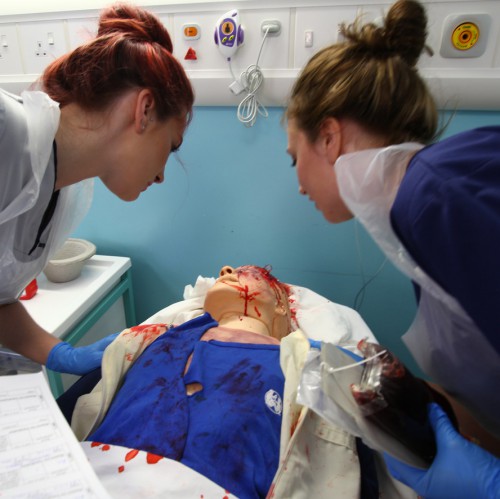Dr Iain Atherton, from the School of Health & Social Care, calls for a rethink on the training of nurses
An ageing population, rising levels of obesity and associated health concerns, and stark inequalities in life expectancy.
These are just a sample of the considerable challenges facing Scotland, and indeed much of the international community, as pressure intensifies on limited health and social care resources.
Now – with people living longer, weight issues contributing to a surge in diabetes and cardiovascular conditions, and poverty and homelessness reinforcing our status as a country of haves and have nots – it is perhaps time for a rethink on how we train our nurses.

In a recent paper, along with colleagues from Scotland and the United States, I called on those involved in nurse education to ‘step up’ to the challenges presented by population health. To date, the wider context so crucial in influencing life chances has been, at best, a marginal part of nurses’ learning. Continuing in this vein is not sustainable.
We believe population health should be a key component of a healthcare professional’s education, and that it should be integrated into nursing programmes at all levels, from undergraduate to continuing professional development.
Nurses are ideally placed to contribute to solutions. Given the scale of the profession, even small changes in curricula and closer engagement with wider societal issues could have a marked impact.
Yet to date, the potential of this large workforce has been insufficiently recognised or utilised. Population health lacks the visibility and immediacy of other demands, and these inevitably, and understandably, are given precedence. By placing the topic at the heart of nurse education, nurses will be empowered to recognise and realise their potential.
The development of a Population and Public Health group at Edinburgh Napier University is setting out to bring about change. And its impact is already being recognised. An academic from the United States, Professor Kathie Lasater, has been awarded a prestigious Fulbright Scholarship that will enable her to spend time in Edinburgh working with the group.
Professor Lasater has internationally recognised expertise in developing the curriculum in nurse education. She was part of an innovative scheme that integrated population health in the learning of students at her home institution, the Oregon Health & Science University, one of the United States’ top universities for nursing. Her prestigious scholarship will enable her to work with the Population and Public Health group at Edinburgh Napier to take that learning and apply it in a Scottish context.

Inevitably, the priority for nurses is the here and now. They are under pressure to deal with pressing and immediate demands, whether to ensure drugs are given on time, patients are clerked-in, and paperwork completed. The less tangible demands of population health will understandably be far from the immediate concerns of most practitioners.
Yet recognition of pressing population health issues, and the efficacy of interventions, can encourage nurses to reflect on the potential of their role. Actions today can reduce pressures tomorrow. And in so doing, nurses can make a real difference to the wellbeing of the Scottish population.
Even in the context of a comprehensive social health care system, those in more marginalised sections of society are at risk of losing out on accessing services. Such outcomes are more usually unintended, perhaps the result of being less able to verbalise concerns and needs, or being less able to comprehend the myriad of written information available.
Recognising problems presented by inequalities - perhaps in relation to accessing services - and taking steps to addressing them, is a key role for nurses. They are in a position to work alongside patients, to explain, and if necessary to advocate. Yet doing so will only take priority if and where there is recognition of needs. Education has a vital role to play in raising practitioners’ awareness. With that raised awareness will inevitably come innovative thinking as to how practice might better contribute to addressing wider issues.
The benefits of these interventions are not easily understood. An admission avoided is unseen. Morbidity that does not occur is evident only in the analysis of epidemiologists. It is here that education is pivotal. Practitioners who are aware of how their interventions might make a difference to their patients’ lives perhaps weeks, months or even years later will be more likely to give priority to the required intervention.
Nurse education must ‘step up’ to raising awareness of the challenges which exist at a population level, but which are made evident in the health experiences of individual patients. Doing so can encourage and enable nurses to make a difference.
Scotland has notable health problems, but it also has innovative and engaged nursing students who want to make that difference.
This piece first appeared in The Scotsman newspaper. You can view the article here